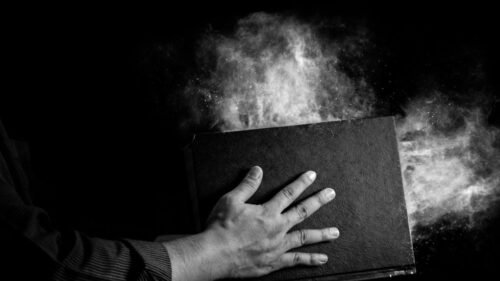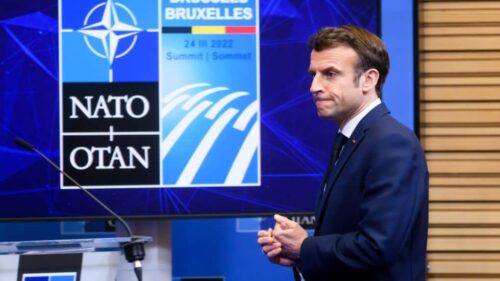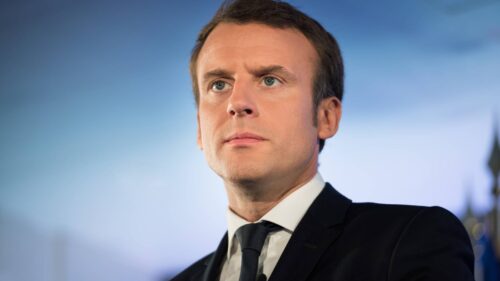It’s time to give the Devil his due. Fair Observer’s resident demon has spent the last eight years publishing his dictionary. Now it’s time to let him argue his case, to instruct us on his vision of the world. Who better than Lucifer’s legal advisor to deconstruct the demonic forces now busy redefining the global order?
In an age when we are instructed not to dialogue with dictators — even at the cost of prolonging disastrous wars — for fear of contaminating our moral purity, why should we listen to the devil’s side of the story? The simple answer is that it is not only instructive but necessary. And the idea is far from new or original.
Imagine that in the Book of Genesis the serpent had been allowed to explain what he was up to when he tempted Adam and Eve. He could have rationally explained that he was doing them an immense favor. He was inviting them to taste the fruit of the “tree of the knowledge of good and evil.” Refrain from eating its fruit and you will never understand what you and the future human race will be up to. If you lack the capacity to distinguish between good and evil, you will live like a mindless consumer in a valley of abundance. Neither the good nor evil you do will have any meaning for you.
Without the intervention of the serpent, Eden would have carried on perpetually as something not unlike the suburban tree-lined consumer society Madison Avenue created for us six or seven decades ago. Humanity would have endured in a perpetual state of blissful ignorance. Think about where this would have led. In the end, even the luxuriant vegetation of Eden wouldn’t have survived the climate change humanity has now provoked. In the final analysis, the serpent set us free!
Europe’s love affair with the devil
Europe has traditionally offered a prominent place in its literature to the Archfiend, Beelzebub, Old Nick, the Prince of Darkness, the ultimate purveyor of evil. Skeptics take his presence to be fiction, but his enduring cultural reality is incontestable. Belief in the devil’s existence helps to accept the horrors, often self-induced, European civilization has so repeatedly endured. Over time, the devil’s character has taken multiple forms. From the Antichrist or “Beast of the Sea” in Apocalypse/Revelation, the final book of the Christian Bible, to fictional characters — like Iago in Shakespeare’s Othello or Keyser Söze in the movie, The Usual Suspects — the diversity of the devil’s incarnations in literature and lore is fascinating.
Dante famously installed Lucifer at the gravitational center of the earth. He was locked into a block of ice, frozen to the waist, with no voice or liberty of movement. Other free spirits, including the serpent at the gates of Purgatory, were available to play out Satan’s traditional role of tempting humans to evil, but Dante’s Lord of Hell was an insatiable three-headed monster imprisoned in the bowels of the earth. The fallen angel who had betrayed heaven even before the creation lived with a single purpose, to eternally devour the three worst traitors in history: Judas Iscariot (who betrayed Jesus Christ), Brutus and Cassius, the main conspirators in the assassination of Julius Caesar.
In his epic poem, Paradise Lost, the 17th century English poet John Milton allowed his Satan a free rein to act everywhere outside heaven. Many literary critics have remarked that Milton’s Satan is the unequivocal hero of the poem. Supremely articulate, his ambition (“Better to reign in Hell than serve in Heav’n”) has served as a model for many modern “leaders.” Politicians, billionaires, oligarchs, media moguls and global entrepreneurs have emulated Milton’s Archfiend. They too see their vocation as having a free rein to manipulate events on earth.
Europe’s descent into hell and France leads the way
Jean-Paul Sartre, the iconic existentialist philosopher known for his left-wing political engagement, famously put in the mouth of one of the characters in his play, Huis clos (“No Exit”) the line: “Hell is other people.” He wasn’t attempting to be misanthropic. Nor was he accusing anyone of being diabolical. He simply meant that when relationships become degraded and the people condemned to live together share no common goal, life itself becomes hell. Now with one quarter of the 21st century nearly behind us, Europe has achieved that state of hellish existence. And it appears to believe there is no exit (actually an inexact translation of huis clos, which designates a private meeting held behind closed doors).
Have a look around today. Doors are closing all over Europe. Relations have become degraded to the point of hellishness. France provides the perfect example. Over the next two to three weeks, Paris will take the lead and possibly get the ball rolling for all of Europe… downhill, of course. There are even fixed dates. It begins with a confidence vote for French Prime Minister François Bayrou’s government next Monday. Barring a miracle sparked by either Bayrou’s or French President Emmanuel Macron’s compelling rhetoric, a vote of no-confidence will prevail.
This will lead to several possible outcomes, all of them ominous. On September 10, France will experience what can only be described as the relaunch of the notorious “yellow vest” movement that plagued Macron’s first term and from which he escaped thanks to the miraculous advent of Covid-19. The declaration of a lockdown allowed him to pose as a “war president.” The new “Let’s block everything” movement emerged this summer and quickly gained steam as a phenomenon more global and inchoate than a traditional general strike, but also more keenly focused on “throwing the bums out.”
If Bayrou can somehow convince enough Socialists to back off, the most active party on the left, La France Insoumise (France Unbowed), intends to depose a motion to impeach the president on September 23. French media has increasingly echoed speculation that the Jupiterian president, despite a constitution that authorizes him to stay in power for two more years come hell or high water, may even choose to resign. The latest poll shows that 63% of the French population want to see the fall of the government and a new snap election for the National Assembly. The Connexion reported a week ago that “two-thirds of the population polled state they want the president to resign if the government collapses next month.”
Any of those events would thrust Macron figuratively into the lowest circle of hell, deprived of even the faintest hope of accessing the Fifth Republic’s traditional political purgatory known as cohabitation. As many observers have noted, the most rational solution — still unlikely given the multiple factors of inertia — might be a French style glorious revolution installing a new constitution and a Sixth Republic. The Fifth Republic, after all, came into existence peacefully, provoked by the inability of the existing government to resolve the war in Algeria.
Can history coalesce around a new coalition?
Along with Germany and the United Kingdom, France shares leadership in the self-proclaimed 2025 version of the “coalition of the willing,” a remake of US President George W. Bush’s 2003 action movie based on a popular work of fiction and subsequently shot on location in Iraq (as many as a million people were also “shot” during the production). This new coalition is a trio of European knights in armor mounted on thoroughbreds clearly champing at the bit to defend a damsel in distress and wage war against the dragon known as Russia.
The forming of the coalition marks a new turning point in European history. Nearly a decade after its spectacular Johnny Depp–Amber Heard-style divorce known as Brexit, the UK has gravitated back to feeling attached (if not yet belonging) to Europe, thanks to its declared intention to contribute the talents of its formidable army (“73,000 active-duty soldiers”) to Europe’s plan to confront Russia in Ukraine. UK Prime Minister Keir Starmer has no qualms about joining forces with unelected European Union President Ursula von der Leyen, a former German defense minister, in a mission destined to redefine Europe itself, not as a marketplace or political union, but as a powerful military entity that will be… er, kind of distinct from NATO but at the same time fully integrated into it… and, um, sort of autonomous with regard to the United States, while remaining totally dependent on it and its weaponry at the same time. A convincing plan, if ever there was one.
With such a well-honed vision of the future, aiming at the kind of enduring military success NATO famously achieved in Afghanistan and Libya, accompanied by territorial conquest (the recovery of Ukrainian lands occupied by Russia), the coalition will prove its capacity to scotch Russian President Vladimir Putin’s clearly expressed ambition of occupying the Champs-Elysee (according to Macron) and maybe even Carnaby Street, while he’s at it.
Once this noble goal is achieved, Europe will undoubtedly enter into its second Renaissance or its Enlightenment 2.0, maybe even both simultaneously. And what an Enlightening Renaissance that will be! Forget about the impending reign of American or Chinese artificial intelligence. Think of the possibilities at the human level. Italy will offer the world an updated Leonardo (da Vinci, not DiCaprio) and Michelangelo (Buonarroti, not Antonioni). The UK will give the world a new and true Shakespeare (not the Stratfordian imposter denounced by actors Mark Rylance, Derek Jacobi and the late writer Alexander Waugh). In Germany, Chancellor Friedrich Merz will eventually return to his previous job as chairman of Blackrock’s supervisory board, but not before recruiting the next “Iron Chancellor” Otto von Bismarck who, like the original, will deploy his exceptional organizational skills to begin preparing his nation for the future “enlightened” domination of Europe — not just industrially, but militarily as well (thanks to its uniquely Aryan discipline).
France and Bastille Day 2.0… sometime this month
Bayrou is doing his best to stand up for a curious post-political order fantasized by Macron when he acceded to what he deemed to be the throne eight years ago. In his first term, to stimulate the economy, the former finance minister and Rothschild Bank strategist generously instituted massive tax cuts for the wealthy. Then, in response successively to the yellow vests, the Covid-19 lockdown and new political pressures, he offered the middle class tax cuts as well. France ended up so deeply in debt that not even Bayrou’s austerity budget would be likely to restore France’s current AA- credit rating. It would already have been downgraded earlier this year but for reasons of hoped-for political stability.
What does that mean? Uncertainty for the future is now 99% certain. Barring a miracle, France’s credit rating will be downgraded and borrowing to fill gaps will be more difficult and more damaging to any new budget, which will be further handicapped by the cost of the downgrade. And, of course, before the end of the year, France may not even have a government, or possibly a president.
But France isn’t the only major nation on an unstable political and financial footing. Starmer’s approval rating has been plunging and UK Member of Parliament Nigel Farage’s right-wing Reform party apparently surging, overtaking both Labour and the Tories. Austerity accompanied by military Keynesianism (a polite word for warmongering) may not be the keys to future electoral success. At the same time, Wolfgang Munchau, an economic journalist formerly of the Financial Times, describes the economic situation of Starmer is dealing with in these terms:
“The problem the UK has today, which it did not have in 1976, is a structurally weak economy with low productivity growth. The UK’s economic model, that of a late-capitalist rentier society, is no longer working. Yet, unlike in the Seventies, the UK lacks a political majority sufficient to arrest the toxic dynamic between rising debt and low economic growth.”
In other words, two of the trio of leaders of the proud coalition of the willing may not be in optimal health. At least things are looking more positive in Germany, some might say. Or are they? Since at least the start of the Ukraine war and the sabotage of the Nord Stream pipeline, experts have been calling Germany “the sick man of Europe.” Reuters claimed in late April that it might “skirt recession” following an inconclusive election in February that saw Merz replace Olaf Scholz as Chancellor. Others see Germany’s recession that began in 2023 as continuous.
Last September, Le Monde worried that “Germany’s major economic error is taking all of Europe down with it.” If it’s at all reassuring for the Germans, one year later, France appears to be the nation that will provoke wider collapse in Europe. On the positive side, Germany’s debt status for the moment remains manageable, in contrast with the UK and France, to say nothing of Italy. But that’s bad news for the coalition of the willing, because it means Germany is unlikely to take new risks. Moreover, most analysts have seen a marked trend towards deindustrialization of the German economy, a shocking turn of events for the nation deemed the industrial locomotive of the European economy.
Merz was elected in February but his approval rating fell to 29% in August and the dreaded right-wing Alternative für Deutschland (Alternative for Germany, or AfD) has emerged as the most popular party. But it gets worse. “Only 19 percent of Germans,” according to the same poll, “believe the [Christian Democratic Union of Germany/Christian Social Union in Bavaria] can effectively address the country’s challenges.” The AfD would be credited with 26% of the vote if an election were held today. And neither the AfD nor former European Parliament Member Sahra Wagenknecht’s economically left-wing party are supportive of the EU and Germany’s commitment to the Ukraine war. Those causes, said to have unified the nation to some degree since 2022, have lost steam, which is very bad news for Queen Ursula and the coalition of the willing.
Europe’s identity crisis weakens its institutions
But there is a further dimension of Europe’s current dilemma that makes it akin to an identity crisis that cuts across all borders. It isn’t new. To some degree, Europe’s sense of identity has been fragilized ever since the end of World War II when its leading countries had to decolonize. Many saw the construction of the European Union as the recommended remedy.
But the lambent malaise has now come to the fore in a severely aggravated state provoked by US President Donald Trump’s return to the White House in January. Is the US our savior or our enemy? Or, in Dante’s diabolical terms, Brutus or Marc Antony? Although the media are carefully avoiding the debate, electors across Europe are asking themselves two questions: “Is Europe a thing?” and, “Do any of our individual nations have an idea where we are being led?” Not only the EU is teetering as it attempts clumsily to understand its relationship with the US in the era of Trump 2.0. So is NATO. Who even has the power to define those relationships? Certainly not Madame von der Leyen, as became obvious during her face-off with Trump on his property in Scotland in July.
Independent journalist and researcher Thomas Fazi holds nothing back when he explains that “what we are witnessing is in fact a case of hyper-vassalisation reminiscent of the dynamics of traditional colonial rule.” The irony is extreme, given not only that the same European nations created the colonial model but some have, on occasion, critiqued the US neo-colonial model that lay at the basis of the post-WWII “rules-based order.” The French distinguished themselves when General De Gaulle, as president, challenged various features of the US system and when Giscard d’Estaing, a future president, aptly described the dollar as America’s “exorbitant privilege.”
Fazi explains the situation today in these terms: “by aligning with Washington’s decade-long strategy of destabilising Ukraine — and, since 2022, embracing NATO’s proxy war against Russia, including the self-inflicted blow of severing access to cheap Russian gas — and then sabotaging Trump’s peace overtures by committing to open-ended financial and military backing for Kyiv, Ukraine, European countries have not only undermined their core economic and security interests, but have also alienated both Moscow and Washington, effectively excluding themselves from any major role in the negotiations.”
Last week, Unherd published an article by Munchau with the title, “Europe’s summer of submission: It has failed to recognise its weakness.” He accuses Europe’s leaders of “insignificance” at the very moment Merz, Macron and Starmer keep vociferously mounting a heroic campaign to mount massive pressure on Russia to force it to negotiate a ceasefire on their terms and on Trump to back the Europeans up. No question but both will bend under such pressure.
Their grandstanding has them so occupied, they apparently failed to tune into the Shanghai Cooperation Organization (SCO) conference taking place in Tianjin, China, where three other equally prominent nations appeared to be coalescing on a number of strategic fronts: China, India and Russia. The major news coming out of the SCO is that Trump’s tariffs appear to have provided the trigger for an unexpected rapprochement between former adversaries, India and China. Indian Prime Minister Narendra Modi and Chinese President Xi Jinping made their intention clear to begin orchestrating a ballet between “the dragon and elephant,” who will soon “dance together.”
This geopolitical earthquake has not unduly impressed the coalition of the willing. The Straits Times summarizes their reaction: “Everything else happening in Tianjin on Aug 31 and Sept 1 is dismissed in European capitals as just diplomatic noise.”
Can it be that the cavernous resonance in the corner of hell Europe’s leaders now inhabit has prevented them from hearing the interesting dialogue taking place on the surface of the earth?
[Lee Thompson-Kolar edited this piece.]
The views expressed in this article are the author’s own and do not necessarily reflect Fair Observer’s editorial policy.
Support Fair Observer
We rely on your support for our independence, diversity and quality.
For more than 10 years, Fair Observer has been free, fair and independent. No billionaire owns us, no advertisers control us. We are a reader-supported nonprofit. Unlike many other publications, we keep our content free for readers regardless of where they live or whether they can afford to pay. We have no paywalls and no ads.
In the post-truth era of fake news, echo chambers and filter bubbles, we publish a plurality of perspectives from around the world. Anyone can publish with us, but everyone goes through a rigorous editorial process. So, you get fact-checked, well-reasoned content instead of noise.
We publish 3,000+ voices from 90+ countries. We also conduct education and training programs
on subjects ranging from digital media and journalism to writing and critical thinking. This
doesn’t come cheap. Servers, editors, trainers and web developers cost
money.
Please consider supporting us on a regular basis as a recurring donor or a
sustaining member.
Will you support FO’s journalism?
We rely on your support for our independence, diversity and quality.










Comment